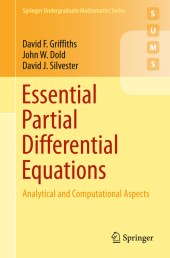 Neuerscheinungen 2015Stand: 2020-02-01 |
Schnellsuche
ISBN/Stichwort/Autor
|
Herderstraße 10
10625 Berlin
Tel.: 030 315 714 16
Fax 030 315 714 14
info@buchspektrum.de |

David F. Griffiths, David J. Silvester
(Beteiligte)
Analytical and Computational Aspects
Analytical and Numerical Aspects
2015. xi, 368 S. m. 105 SW- u. 1 Farbabb., 13 Tab. 235 mm
Verlag/Jahr: SPRINGER, BERLIN 2015
ISBN: 3-319-22568-5 (3319225685)
Neue ISBN: 978-3-319-22568-5 (9783319225685)
Preis und Lieferzeit: Bitte klicken
Setting the scene.- Boundary and initial data.- The origin of PDEs.- Classification of PDEs.- Boundary value problems in R1.- Finite difference methods in R1.- Maximum principles and energy methods.- Separation of variables.- The method of characteristics.- Finite difference methods for elliptic PDEs.- Finite difference methods for parabolic PDEs.- Finite difference methods for hyperbolic PDEs.- Projects.
This volume provides an introduction to the analytical and numerical aspects of partial differential equations (PDEs). It unifies an analytical and computational approach for these; the qualitative behaviour of solutions being established using classical concepts: maximum principles and energy methods. Notable inclusions are the treatment of irregularly shaped boundaries, polar coordinates and the use of flux-limiters when approximating hyperbolic conservation laws. The numerical analysis of difference schemes is rigorously developed using discrete maximum principles and discrete Fourier analysis. A novel feature is the inclusion of a chapter containing projects, intended for either individual or group study, that cover a range of topics such as parabolic smoothing, travelling waves, isospectral matrices, and the approximation of multidimensional advection-diffusion problems.
The underlying theory is illustrated by numerous examples and there are around 300 exercises, designed to promote and test understanding. They are starred according to level of difficulty. Solutions to odd-numbered exercises are available to all readers while even-numbered solutions are available to authorised instructors.
Written in an informal yet rigorous style, Essential Partial Differential Equations is designed for mathematics undergraduates in their final or penultimate year of university study, but will be equally useful for students following other scientific and engineering disciplines in which PDEs are of practical importance. The only prerequisite is a familiarity with the basic concepts of calculus and linear algebra.
"The book is written in an engaging and lively style that will appeal to students. ... aim of the Springer SUMS series is to take a ´fresh and modern approach´ to core foundational material through to final year topics. This book delivers on that promise with great success. ... As a first text that is set at the appropriate level ... which recognizes and incorporates numerical computation as an essential tool for learning and understanding, it looks hard to beat." (Mark Blyth, SIAM Review, Vol. 59 (1), March, 2017)
"UK mathematicians Griffiths (Univ. of Dundee) and Dold and Silvester (both, Univ. of Manchester) introduce undergraduates to partial differential equations (PDEs) from both the analytical and numerical points of view. ... Summing Up: Recommended. Upper-division undergraduates through professionals/practitioners." (D. P. Turner, Choice, Vol. 53 (11), July, 2016)
"This introduction to partial differential equations is designed for upper level undergraduates in mathematics. ... The writing is lively, the authors make appealing use of computational examples and visualization, and they are very successful at conveying and integrating physical intuition. ... This is probably the best introductory book on PDEs that I have seen in some time. It is well worth a look." (William J. Satzer, MAA Reviews, maa.org, April, 2016)
"This textbook offers a nice introduction to analytical and numerical methods for partial differential equations. ... The book is self-contained and the prerequisites is a standard course in calculus and linear algebra. The textbook appeals to undergraduate students in both scientific and engineering programs in which PDEs are of practical importance." (Marius Ghergu, zbMATH 1330.35001, 2016)


